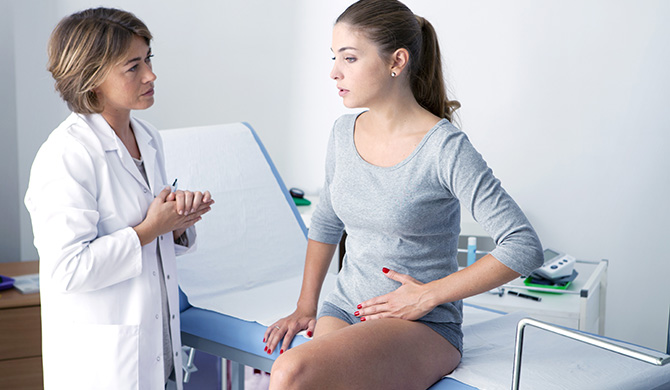Login
Urogynecology is a medical specialty that focuses on the diagnosis and treatment of pelvic floor disorders, which affect the muscles, ligaments, connective tissues and nerves that support the bladder, uterus, vagina and rectum.
However, having these conditions doesn’t mean you have to put up with them. Our experts are here to help with all aspects of urogynecology to help you live in comfort.
Our physicians are board-certified in obstetrics and gynecology and are the only urogynecologists in Delaware board-certified in female pelvic medicine and reconstructive surgery. Treatment options include physical therapy, medications and surgery. Surgery may be outpatient, minimally invasive or major, depending on your needs and preference. Our patients also may be able to participate in research clinical trials, providing access to potential new treatments.

Conditions We Can Treat
Prolapse - A common condition where an organ stretches down into or out of the vagina as the result of pregnancy, childbirth or other actions. Organs that can drop from their normal position include the bladder, uterus and rectum. Treatments can include exercises to strengthen muscles, insertion of a pessary to hold the vagina in place or in some cases, surgery to correct and repair.
Urinary incontinence – The uncontrolled loss of urine from the bladder, which can occur at any time. We offer treatment for all types so that you can live in comfort and dignity.
Fecal incontinence – The involuntary loss of fecal matter or gas. A common condition with up to 11% of women experiencing it, we offer a number of treatments including medical, strengthening exercises, implants and surgery.
Vulvodynia and vulvar vestibulitis – A condition associated with pain in the opening of the vagina which is experienced by women of all ages. Treatments can include medication, behaviour management, strengthening exercises, diet adjustment and the treatment of related conditions. Other options include injection, therapy and surgery.
Urinary-tract infection – Occurs when bacteria contaminate any part of the normally sterile system of organs and tubes that process, store and move urine through and out of the body. The urinary tract includes the kidneys, ureters, bladder and urethra. We can treat a number of infections with antibiotics, as well as investigate any underlying causes.
Interstitial cystitis – Also known as Painful Bladder Syndrome affects at least 3-8 million of women in the US. Treatments can include medication, diet modification, strengthening the pelvic floor, medicating the bladder, implant of a device or surgery.
Genital fistula – A drainage problem in the bladder or bowel caused by the formation of a hole between these organs.
How are these conditions treated?
Urogynecology FAQs
A urogynecologist is a physician who specializes in treating women with a variety of disorders to the pelvic floor. This specialist is also sometimes called a female urologist.
Before the urogynecology specialty was created, women with pelvic-floor disorders typically had to visit multiple specialists and receive treatment for problems in the urinary, gastrointestinal and reproductive systems separately. A urogynecologist can manage all these conditions comprehensively.
In addition to completing medical school, a urogynecologist must have completed a four- or five-year residency program in urology or obstetrics and gynecology, plus an intensive three-year fellowship in female pelvic medicine and reconstructive surgery.
The National Institutes of Health estimate one-third of women in the United States will experience pelvic-floor disorders in their lifetime. Childbirth, repeated heavy lifting, chronic diseases and surgery can weaken the pelvic floor. Inherited factors also can contribute.
While pelvic-floor disorders become more common as you get older, they are not inevitable. Depending on the severity of your condition, a range of treatments are available to minimize the symptoms or repair the damage.
In addition to a comprehensive history and physical examination, our physicians may also rely on several types of evaluations, including:
Urodynamics: A small catheter is placed into the patient’s bladder to measure pressure in the bladder and urethra while the bladder is filled with water. The patient answers a series of questions to help determine how much her bladder can hold, after which she urinates, and the amount or urine is measured. The test is not painful and lasts approximately 20 minutes. The patient may stop the test at any time.
Cystoscopy: A small tube-shaped camera is inserted through the urethra to view the bladder for details that are difficult to see with an X-ray. The cystoscope is flexible and no larger than a catheter. The camera is attached to a monitor so that the patient can view the inside of her bladder as well. The test is not painful and lasts approximately 5 minutes. The patient may stop the test at any time.
Urinalysis: A patient’s urine is checked at each visit to ensure that she does not have an infection.
Bladder ultrasound: An image of the patient’s bladder is taken at each visit to ensure you she is emptying it completely. This is not invasive or painful.
Endo-anal ultrasound: A small ultrasound probe is gently inserted one inch into the rectum to see if the anal sphincter is intact.
Pelvic-muscle evaluation: A physical exam or an electronic monitoring device is used to measure the patient’s ability to contract her pelvic muscles.
Anorectal manometry: A small balloon is placed in the rectum to measure the strength and ability of the rectum to contain the bowels. While awkward, this test is not painful and lasts only a few minutes. The test may be stopped at any time.
Radiology: A variety of X-rays may be used as appropriate to aid diagnosis.
Once our doctors determine the cause of your pelvic-floor disorder, they may provide a variety of treatment options, including:
- Medications.
- Physical therapy.
- Behavior modification.
- Alternative medicine.
- Reconstruction of the pelvic floor using both minimally-invasive and more complicated surgical techniques. Specialties include vaginal, abdominal, laparoscopic and robotic surgery using da Vinci technology.
Find Your Provider
Locations
There are no ChristianaCare services in your selected area.
Displaying 3 out of 3 ChristianaCare locations
Displaying {0} out of {1} ChristianaCare locations
Center for Urogynecology & Pelvic Surgery at Smyrna Health & Wellness Center
100 S. Main Street, Suite 215
Smyrna, DE 19977

Center for Urogynecology & Pelvic Reconstructive Surgery at Concord Health Center
161 Wilmington-West Chester Pike
Chadds Ford, PA 19317

Christiana Hospital, Medical Arts Pavilion 2
4735 Ogletown-Stanton Road,
Suite 1208,
Newark, DE 19713
Mon
Tues - Thurs
Fri
7.30 - 18.00
7.00 - 18.00
7.00 - 16.30
There are currently no providers found, please come back later!
Related Content
Urogynecology A-Z Services List
Accidental Bowel Leakage
Take back your life from accidental bowel leakage. There are options to help control your symptoms.
Chronic pelvic pain of vagina and vulva
Why am I having chronic pain in my pelvis, vagina or vulva?
Fecal Incontinence
Fecal incontinence is the involuntary loss of fecal matter or gas. Leaks can be distressing because they are unpredictable.
Female Sexual Dysfunction
Why isn’t sex enjoyable? Female sexual dysfunction is a common — and often treatable — problem. Find out more on our website.
Genital Fistula
Get help for Genital Fistulas. Surgery can address the embarrassing symptoms.
Interstitial Cystitis
Manage the symptoms of Interstitial Cystitis. Lifestyle changes, medication can help.
Pelvic Floor Muscle Dysfunction
High-tone pelvic-floor muscle dysfunction is one of the most common causes of pelvic pain.
Pelvic Organ Prolapse
Find relief from the pressure and pain of pelvic organ prolapse. Treatments can strengthen and support.
Recurrent urinary-tract infections
Coping with chronic urinary tract infections. Women have a higher risk of having recurrent UTIs. Find out what you can do.
Urinary Incontinence
There are several types and treatments for urinary incontinence. Find out more on our website.
Vulvodynia and Vulvar Vestibulitis
Vulvodynia is a condition associated with pain in the opening of the vagina. This includes tenderness and profound burning.
.webp/_jcr_content/renditions/original)

